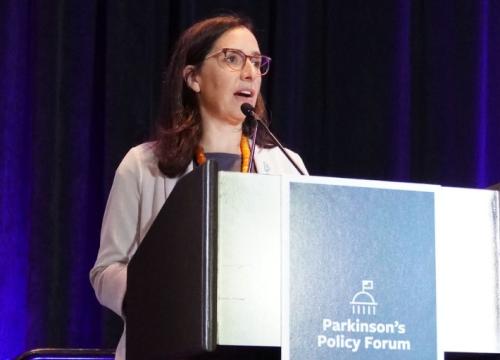Our Research
Exciting programs that lead to better care, pathways to new treatments, and ultimately a cure.

💡 Quick Summary
-
We fund innovative scientists, our genetics study and Centers of Excellence to uncover the causes of Parkinson’s, improve treatments and accelerate progress toward a cure.
-
Programs like PD GENEration and Parkinson’s Virtual Biotech generate discoveries that raise care standards, reduce complications and improve quality of life.
-
By studying why some people live well with Parkinson’s and sharing research insights, we help people with PD and clinicians apply proven strategies for better outcomes.
Better treatment starts with better research. Some people with Parkinson’s disease (PD) live well for decades with only minimal impact from their disease. We focus our research on understanding how these people — and their doctors — achieve these excellent results. Our goal is to help others apply what we learn to their own unique experience.
The Parkinson’s Foundation funds research through these priority programs dedicated to finding the cause, and ultimately, a cure for PD:
- Grants and Fellowship Awards: Our research grants fund promising, innovative scientists around the world who work towards the breakthroughs that can lead to better treatments.
- Parkinson’s Virtual Biotech: Together with Parkinson’s UK, we are funding the development of new therapies aimed to treat, and ultimately cure, Parkinson’s. Through this initiative we aim to deliver the next Parkinson’s treatment in years, not decades.
- PD GENEration: Powered by the Parkinson’s Foundation: Our global initiative is the first-of-its-kind that offers free genetic testing for clinically relevant Parkinson's-related genes and free genetic counseling to help participants better understand their results.
- Centers of Excellence: We designate top academic medical centers dedicated to combining Parkinson’s care with groundbreaking research. Through this program, we are raising the standard of care for everyone with Parkinson’s.
We are focused on the next Parkinson’s disease breakthrough while working to bring expert care access to everyone living with PD to ensure they achieve the best results now. We’ve already shown that our model of Parkinson’s care — the highest standard of care — reduces complications and dramatically increases quality of life.
The Latest in Research
Finding a Cure
Breakthrough scientific research that improves care for everyone living with Parkinson’s is at the heart of our mission. Find out how we advance research and work towards ending Parkinson’s.
Join Our Genetics Study
Understanding your genetic tie to Parkinson’s can be empowering. PD GENEration offers genetic testing for PD-related genes and genetic counseling.
Key Findings That Matter
Differences in care dramatically impact daily life with Parkinson’s. Our Parkinson’s Outcomes Project findings can help you advocate for your best care.
Our research is leading to care and treatment breakthroughs that bring hope to thousands of people and families.
Our research has shown that:
- Regular neurologist care can save the lives of thousands of people with PD each year
-
Depression and anxiety are the number one factors impacting the overall health of people living with PD
- People with PD receive different medicines and treatment plans depending on where they receive care, with vastly different results
Help Us Advance Research
When you give to the Parkinson’s Foundation, you’re helping push scientific discovery forward.
Grant Awards
Every year, we fund the most exciting and promising research ideas in the Parkinson’s field. The next breakthrough can occur anywhere, which is why we have provided research funding to more than 670 scientists since 2010, furthering critical research currently underway in labs at medical centers, neurologist offices and universities around the world.
Join the Fight Against Parkinson's
Support ground-breaking research, care and community outreach
Related Materials
Related Blog Posts

Shaping the Future of Parkinson’s Policy: Meet Our Chief Strategy and Policy Officer

Mapping the Brain in High Resolution: How the University of Michigan is Advancing Parkinson’s Neuroscience
